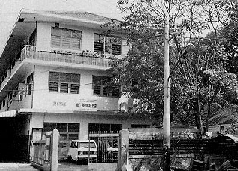By Kornelius Purba, Jakarta
The complaints of a Muslim waitress who works at an all-pork restaurant in a Bandung shopping center and a Jakarta taxi driver who has not picked up a single foreigner for months about the country's economy are very simple, but based on real-life experiences.
And the stories of these two people serve as a direct challenge to the rosy economic picture painted by President Susilo Bambang Yudhoyono in his State of the Nation address two days before Independence Day on Thursday. Even the President's most outspoken critics could not offer such a clear rebuttal to Yudhoyono as this waitress and taxi driver.
"Selling pork is unimaginable for me as a Muslim. But I have no choice. Even selling your own flesh is a tough job these days," the waitress said when asked why she worked in the restaurant. And she is even worried about losing this job because of slow sales.
Judging by the lack of foreigners he has seen in Jakarta, the driver for Putra Taxi is confident in saying that foreign investment has continued to drop off in the past several years.
During the Soeharto years, he could pick up at least one foreigner a day. "But over the last two years, I have gone months at a time without meeting a single foreigner."
In his speech, where he also delivered a draft of the 2007 state budget, Yudhoyono proudly announced the country's economy was growing steadily, and that unemployment and poverty had declined significantly. He also said he was pleased to say that foreign direct investment was increasing.
Listening to Yudhoyono speak was a lot like listening to the annual speeches of his four predecessors -- excluding Sukarno, because I never paid attention to his speeches. Soeharto, of course, is a special case because no one dared to openly criticize his speeches.
As a friend said, Yudhoyono was not entirely wrong when he cited rather outdated data to support his claims about declines in poverty and unemployment. "You can claim that you are fit, citing a clean bill of health given to you by your doctor. You just don't mention the doctor saw you a year ago."
Several senior economists criticized the President's speech, and also blamed his speechwriters and economic ministers for providing misleading statistics. But if their positions were switched, and they were in government, they'd probably do the same thing.
When the waitress said "even selling your own flesh is a tough job", no further explanation is needed to understand how difficult life is here, at least in her view.
The taxi driver may not understand statistics, but even Investment Coordinating Board chairman M. Lutfi would find it hard to argue with his observation that foreign investors have abandoned the country.
The President should not be irritated with his critics. Ordinary people -- the silent majority -- never take his promises seriously. For them it is just a matter of routine for a president to talk about all the good things his government is doing. The President was elected by the people and is being paid to make the country better. And most people are quite happy with him because they know he works very hard (not necessarily very smart).
Ordinary people will not complain much even when their leaders are not able to ease their suffering. Sure, they might get upset if their leaders are so busy enriching themselves they neglect the people. But Yudhoyono is not like that. His ambition is to enrich the nation, although ambition is completely different from reality.
Independence Day passed last week. But please, do not let me wait for another year to make an observation about what freedoms we still have. (Perhaps only freedom of speech is left.)
I met the waitress on the morning of Aug. 17 in Bandung, and the taxi driver later that same day in East Jakarta. For these two, independence means the ability to have an "appropriate job and a decent income".
When the nation celebrated its 61st year of independence on Thursday last week, our founding fathers may have been weeping in their graves as people across the country asked, "Are we really independent?"
Sure, millions of people were happy to celebrate Independence Day and people are always grateful that God granted them independence from colonial powers (although the government often acts more heartlessly than the colonialists, and people are still unable to liberate themselves from the government). In the last eight years, our leaders have continued to boast that the economy is growing and the glory days we enjoyed a long time ago will soon return.
Despite the gloomy situation, I am still confident in saying Indonesia is a great nation. Why? Because we never look back (wise men call it introspection), but continue to prepare ourselves for the incoming disasters and misery! Why should we learn from history when neglecting that history helps us feel there is nothing wrong with us?
The writer can be reached at purba@thejakartapost.com.
Thursday, August 24, 2006
Subscribe to:
Post Comments (Atom)


No comments:
Post a Comment